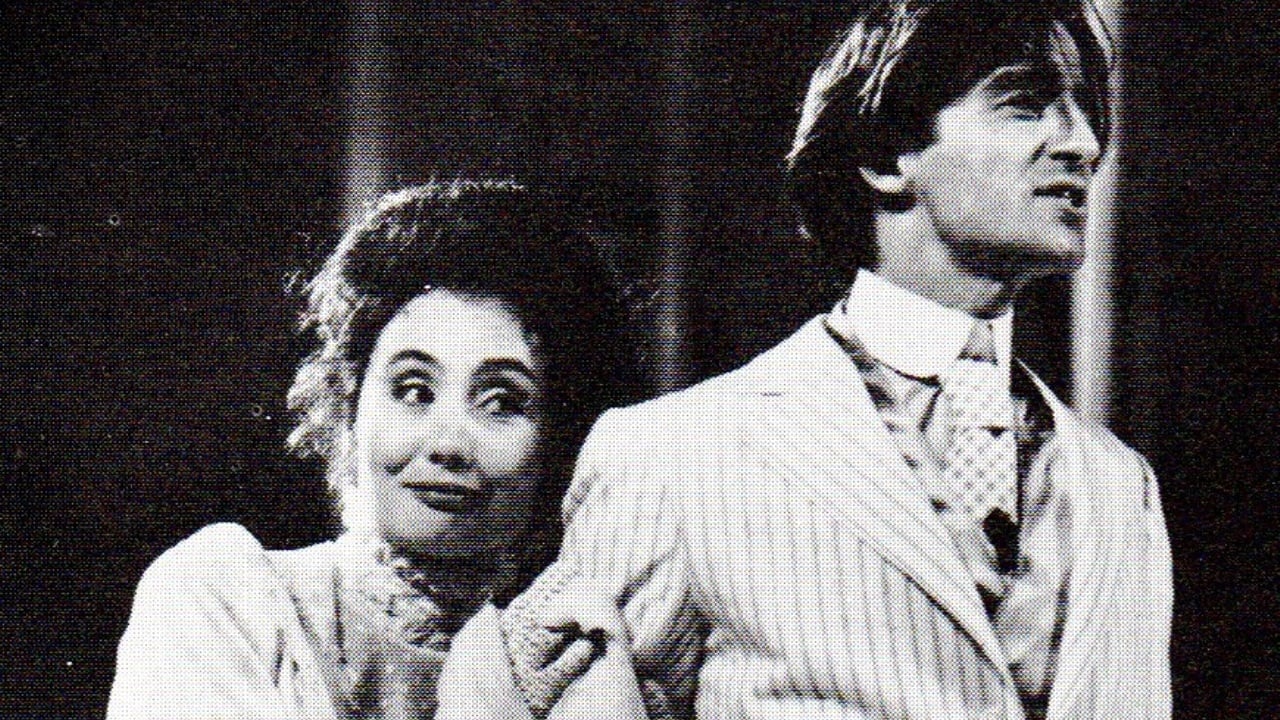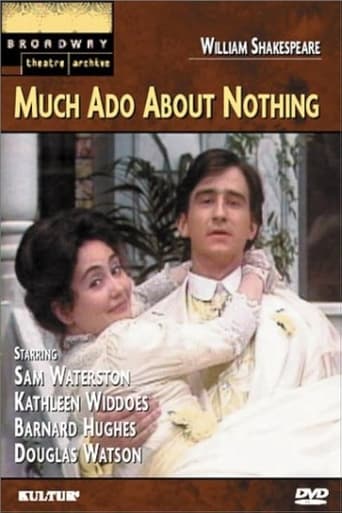SparkMore
n my opinion it was a great movie with some interesting elements, even though having some plot holes and the ending probably was just too messy and crammed together, but still fun to watch and not your casual movie that is similar to all other ones.
BelSports
This is a coming of age storyline that you've seen in one form or another for decades. It takes a truly unique voice to make yet another one worth watching.
Stephanie
There is, somehow, an interesting story here, as well as some good acting. There are also some good scenes
Kayden
This is a dark and sometimes deeply uncomfortable drama
theowinthrop
MUCH ADO ABOUT NOTHING is considered by Shakespearean Scholars to be one of three plays call the "Joyous Comedies". The other two are AS YOU LIKE IT and TWELFTH NIGHT, and the subject of them is either joy of living or love. They are considered a high point in Shakespeare's development as an artist on par with his dramatic height in his tragedies of the same period (HAMLET, MACBETH, OTHELLO, KING LEAR). And yet, while college courses spend time teaching TWELFTH NIGHT and MUCH ADO and AS YOU LIKE IT to the public, most people who like theater think that Shakespeare's best comedy was the earlier A MIDSUMMER'S NIGHT'S DREAM. TWELFTH NIGHT is revived more frequently than the other two joyous comedies, but A COMEDY OF ERRORS or THE TAMING OF THE SHREW (politically incorrect as the latter is now) are more popular.The problem with MUCH ADO is that it's great wit is hidden by the style of Shakespeare's writing. He was always mixing styles of humor, from low types like Bottom to the height of witty conceits. The early Shakespeare, like his contemporaries, was impressed by John Lily's EUPHUES, an early comedy of puns and word plays. Shakespeare, of course, could knock this off quickly - but the problem of dealing with this is that (except for those lines based on sexual punning) most of his references are so obscure that one needs some type of guide to explain them. This is particularly the case when dealing with Beatrice and Benedict and their wit duels. Most audiences these days can't follow them too well. So the presentation of the amusement has to beef up that portion.This particular production was produced by Joseph Papp in 1973, and I was lucky enough to see it when my college offered it as a free trip to the city. As I had a Shakespeare course at the time, it fit in well.The cast was made up of New York theater and television figures. Today, the actor playing Benedict (Sam Waterston) is the best known (as is F. Murray Abraham, here in a minor part), because Waterston is A.D.A. McCoy on LAW AND ORDER, and Abraham is an Oscar winner and a star of Broadway productions (ironically in another Shakespeare "comedy" right now: THE MERCHANT OF VENICE). But in 1973 the soap opera performers Douglass Watson and Kathleen Widdowes (as Don Pedro and Beatrice) were better known to local audiences, and Bernard Hughes (as Constable Dogberry) was developing a prominence in television and the movies (his best known film role was as the deadly avenging patient in Patty Chayevski's THE HOSPITAL (1971)). The production made sure that the story (originally in an Italian principality in the Rennaisance) was reset in the U.S. during the aftermath of the Spanish American War.The production had it's rewards. Little bits of business stick to the mind - like Widdowes and her girlfriends stealing puffs from a regular tobacco cigarette in 1900 (something unheard of among good young ladies - but Beatrice, after all, is somewhat daring. Waterston, going canoing and paddling backward (the canoe was on a turntable on stage), getting out, and then hiding behind the upright canoe, as though it is leaning against a tree (and it is not fooling the other actors on stage). But best in the production was Hughes as the impossibly dense policeman, who has a "Keystone Kop" force to assist him in seeking out the criminals. Up to his last line, when he announces he has captured the ringleader and has put his hands in a pair of MONACLES (not manacles) Hughes acted like he was Ford Sterling returned to life. Note should also be taken of the late Jerry Mayer as the bad natured Don Juan, who when thwarted in one evil plot at the start gave one of the funniest hissy fits on record.Most of these items were in the film version as they were on the stage. The production was a good one, though nothing remarkable. I would recommend seeing the video of the production, to enable one to see a good cast at work in an interesting concept for the production. But if one wants to understand the verbal jousting of the two lovers, read the play and follow the glossary of terms that are included.
Gena DeAragon (dearagon)
Admittedly I saw this when I was a teen, and haven't seen it since, but my recollection is of a bright, sprightly, and interesting version of Much Ado, set in the time of the Spanish-American war. So maybe this is a good version for those who aren't Shakespeare snobs or so jaded with Shakespeare that most versions fail to satisfy. I remembered Sam Waterston as Benedict for decades when the only other time I saw him on film was as the rather colorless narrator in Great Gatsby, and was happy to see him appear as a major character on Law and Order. Much Ado is my favorite Shakespeare comedy, and I saw an excellent production of it in London the year after this version was shown on TV, so I hardly think it could have been too lacking in overall quality or it wouldn't have held such a place in my memory.
kbuswell
This is a very bland and inert production of one of Shakespeare's most vibrant plays. I can only guess that the intent was to make the play as accessible and understandable as possible to an audience that has not been exposed to Shakespeare before. By doing this, though - by making every line clear and every intent obvious - they have drained the play of life and turned it into a flat caricature. Somehow, it is actually boring - a very hard feat given such wonderful material.The acting is forgettable at best - Sam Waterston as Benedick and Douglas Watson as Don Pedro. Others, however, do not fare so well. April Shawnham's Hero is a pouty, breathless airhead that frequently provokes winces. Jerry Mayer's Don John is a nonsensical cartoon character on the level of Snidely Whiplash (though Snidley was much more enjoyable).F. Murray Abraham (you know, the guy who killed Mozart?) is not in this version, unless he was in disguise and had his name removed from the credits.Given that the producer, Joseph Papp, is basically a theater god, this production is not only disappointing but head-scratching as well.Don't bother with this. Watch Branagh's Much Ado instead - his version is overflowing with vitality and humor, to say nothing of wonderful performances.
Coxer99
Well acted rendition of the bawdy Shakespeare romance-comedy about lovers being united with stand out performances from Hughes, in an excellent turn as bumbling constable Dogberry and Waterston as an aristocratic Benedick. For fans who want something different than the Branagh version.

